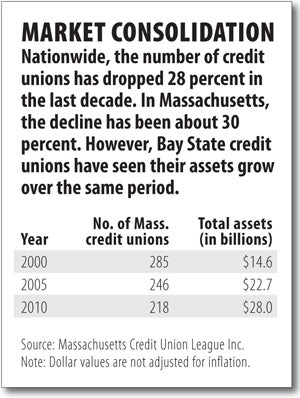Business turnover in any industry is normal. Some companies die out while new businesses begin. It happens in the credit union sector just like in any other.
But some credit union analysts say the trend over the last decade is about something more than just the natural course of business.
Big credit unions are getting bigger and there are more of them while small credit unions are dwindling in number. All this is happening while the total number of credit unions continues to decline around the country.
“Part of it is economies of scale, part of it is a changing competitive landscape,” said Bill Bradway, an independent financial researcher at Bradway Resarch LLC, based in Framingham, who compiled a new report tracking trends in the credit union industry based on government reporting data.
Size Matters
The total number of credit unions in the country has dropped 28 percent in the last 10 years, from a high of 10,744 in 1999 to 7,710 registered with the federal government last year, according to Bradway, who analyzed data from the National Credit Union Administration.
Following the trend are credit unions of small sizes. Credit unions holding less than $25 million in assets continue to be the predominant type of credit union in the country, but they have dwindled in number from 8,152 in 1999 to only 4,516 last year. That’s a 45 percent drop.
Meanwhile, the number of large credit unions in the country continues to balloon.
In 1999, there were only 36 credit unions in the country with more than $1 billion in assets. Last year the government reported that there were 159.
While the total number of credit unions has dropped by 28 percent and credit unions with less than $25 million in assets have fallen by 44 percent, the number of large credit unions has grown by more than 300 percent.
Daniel Egan, president of the Massa-chusetts Credit Union League Inc. in Marlborough, which represents more than 200 credit unions in the state, points to one clear factor that has caused the decline of the small-asset credit union.
“This is a direct response to smaller asset credit unions not being able to maintain the continuingly increasing regulatory requirements,” said Egan.
State and federal regulations are increasingly complex and difficult for small-staffed credit unions to handle, credit union officials claim.
For example, since the 2001 terrorist attacks, the federal government has much more onerous bank secrecy protections which require financial institutions to establish secure processes for tracking the identities of depositors.
So does the declining number of credit unions, specifically, small credit unions matter?
Bradway, who compiled the research, argues that while the trend has been prevalent in the last decade, it is not necessarily a bad thing.
“It’s a bit like the survival of the fittest,” he said. “Everyone has the same rules, but that doesn’t mean every bank or credit union executes well or is picking the right strategy.”
Bradway said the financial collapse in 2008 may have been an indication that there may be too many financial institutions that do not have the right strategy or business plan. It’s natural for those organizations to cease.
Egan, the credit union league director, disagrees. He too points to the financial industry collapse, but says that indicates the need for smaller, locally-based credit unions and banks.
“Given the recent economic crisis, the whole idea of ‘too-big-to-fail’ is being called into question,” he said. “We’re seeing an increased interest in people going to credit unions to have the safety and security of local financial institutions.”
Debbie Guiney, president of Allcom Credit Union in Worcester, may have a solution. Guiney and a group of about a dozen small-asset credit unions in Central Massachusetts have decided to band together and use their joint purchasing power to achieve those economies of scale.
For example, many of the banks in the ad-hoc consortium can’t afford an IT manager. Allcom recently entered into a partnership with other credit unions to split the cost of the service.
“We got a great price for someone to come in, do IT audits and check for vulnerabilities and it was much less than what any of us could have individually achieved,” she said. “This type of collaboration will be critical for institutions to survive.”

